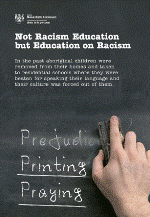2008: Celebrating the 60th Anniversary of the Universal Declaration of Human Rights
Universal Declaration of Human Rights: Introduction
Sixty years ago, nations of the world joined together in recognizing that all peoples, in all nations, are free and equal regardless of race, religion, economic status, age, gender or other personal characteristics. Through the signing of the Universal Declaration of Human Rights in 1948, the United Nations brought into being the first international document recognizing human rights as the foundation of peace, justice and freedom in the world.

The Universal Declaration outlines 30 basic rights essential for all human beings to achieve their full potential and to live a life free of fear and want. It was a unique approach that developed from the world saying 'never again' to the horrific events of World War Two, a war that brought a scale of atrocity never previously witnessed. The global death count is estimated to have been more than 50 million. War crimes were widespread: from the infamous Holocaust in which Nazi Germany sought to eliminate 'undesirables' such as Jews, Poles, Slavs, Roma, Sinti, the mentally and physically disabled, homosexuals and other persons, to the use of sex slaves, otherwise known as 'comfort women', by Japanese soldiers. Labour camps were used throughout the world and, disturbingly, World War Two brought the first testing of biological warfare by Japan and the use of atomic bombs in Nagasaki and Hiroshima by the United States of America. Read more...
Human Rights in Canada

Human rights represent glorious ideas. We also need effective ways of implementing them and ensuring they are enforced. The Universal Declaration of Human Rights expresses a vision of basic human rights, and a shared commitment to making those rights a reality.
In its Preamble, the Universal Declaration states:
- it is essential for human rights to be protected by the rule of law;
- all peoples and nations shall strive to promote respect for human rights and freedoms through teaching and education; and
- all peoples and nations shall take national and international measures to secure universal and effective recognition of human rights and freedoms.
The rights listed in international declarations and covenants such as the Universal Declaration only become enforceable when a government makes them part of a country's domestic law. Human rights documents and legislation exist at various levels: international, national, provincial and territorial, and sometimes, the local, municipal level.
In Canada, the Universal Declaration has inspired legislation that includes the Charter of Rights and Freedoms along with federal, provincial and territorial human rights laws. These laws reflect the Universal Declaration's principle of equality, and the statement in Article Two that "Everyone is entitled to all the rights and freedoms set forth in this Declaration, without distinction of any kind, such as race, colour, sex, language, religion, political or other opinion, national or social origin, property, birth or other status."
Human rights laws in Canada protect people from discrimination and promote equality in public areas of life including education, employment, housing and public services. Although human rights legislation is similar in all Canadian jurisdictions, federal, provincial and territorial, there are small differences among the protections covered. For an overview, visit the Canadian Human Rights Commission's web site at http://www.chrc-ccdp.ca/publications/pgd_mdi-en.asp.
Canada's federal, provincial and territorial governments have strengthened human rights protections by creating human rights commissions as "arm's-length" agencies to enforce human rights legislation. These commissions need a certain amount of independence from government to ensure they can take action against government, if necessary. As an alternative, some governments have created direct access human rights tribunals to hear and make decisions about individual complaints of discrimination.
Human rights laws give human rights commissions several strategies for preventing discrimination and promoting equality. They include:
- public education, communications and policy development;
- broad, proactive programs and partnerships;
- a complaint process to address incidents of discrimination (this responsibility is handled or shared by a human rights tribunal in some parts of the country); and
- the power to conduct inquiries into systemic discrimination and to intervene in situations of conflict and tension.
These theme pages, for example, are a joint, public education project of CASHRA, the umbrella organization of human rights agencies listed below.
At the international level, the United Nations has six expert committees responsible for monitoring human rights around the world. These committees regularly ask member states for reports on how their countries are complying with and implementing the Universal Declaration and related conventions, declarations and covenants passed by the UN General Assembly. These committees are:
- Human Rights Committee;
- Committee on Economic, Social and Cultural Rights;
- Committee on the Rights of the Child;
- Committee on the Elimination of Racial Discrimination;
- Committee on the Elimination of Discrimination Against Women; and,
- Committee Against Torture
Canada reports regularly to these committees and human rights commissions are usually asked to provide input into Canada's reports to UN expert committees. These agencies are also consulted in country audits, on topics such as racism, by international rapporteurs representing the United Nations.
Find out more about the human rights agency in your region – learn what they do, how they can help and the publications and services that are available.
Canadian Human Rights Commission
Telephone: (613) 995-1151, or toll free 1-888-214-1090. TTY: 1-888-643-3304.
info.com@chrc-ccdp.ca
Website: http://www.chrc-ccdp.ca/
Provincial and Territorial Human Rights Agencies
Alberta Human Rights and Citizenship Commission
British Columbia Human Rights Tribunal
Manitoba Human Rights Commission
New Brunswick Human Rights Commission
Newfoundland and Labrador Human Rights Commission
Northwest Territories Human Rights Commission
Nova Scotia Human Rights Commission
Nunavut Office of the Human Rights Tribunal
PO Box 15, Coral Harbour, Nunavut X0C 0C0
Toll Free: 1866 413 6478
Ontario Human Rights Commission
Prince Edward Island Human Rights Commission
Québec - Commission des droits de la personne et des droits de la jeunesse



